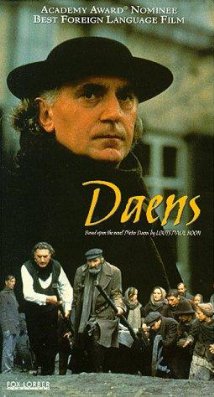
DAENS
Belgium, 1992, 138 minutes, Colour.
Jan Decleir, Gerard Desarthe, Antje de Boeck.
Directed by Stijn Coninx.
At the time of the centenary of the social encyclical, Rerum Novarum. 1891, Pope Leo XIII, Daens had a successful release in Belgium and was Belgium’s Oscar-nomination for 1992.
It is a significant picture of a priest, a 19th century champion for the rights of workers, a portrait at the end of the 20th century, at a time of critical reflection on the nature of priesthood.
Jan Declier plays Adolph Daens, a middle-aged priest who returns to his hometown of Aalst, discovering the oppressive conditions in a textile factory, with all the men are being fired so that the owners can pay lower wages to women and children who are forced to work excessive hours, children falling asleep on the job, in danger of injury from the machinery. He takes up their cause as well as the rights of other factory workers, his brother publishing facts in the local newspaper. He falls foul of criticism from the wealthy owners, from conservative Catholic politicians, from the local bishop.
He is supported by Socialist and Liberal politicians and, symbolically, by a 17-year-old, Nette, the only breadwinner in her family. Daens is a powerful preacher, making clear his views about the rights of workers. He is summoned to run by Pope Leo XIII and ordered to stop his political activities or else he will be dismissed from the priesthood. That is the option he chooses, is defrocked, but continues his campaigns.
This is the kind of portrait of a priest, in the aftermath of the Liberation Theology movement in Latin America, which stirred audiences with social concern, which stirred Catholics who were involved in social justice issues. It serves as a critique of the blindness of Christians more doctrinally-oriented than socially concerned.
Director,Stijn Coninx, also made the film Soeur Sourire about the “Singing None”, with Cecile de France in the title role. Jan Decleir is a distinguished Belgian actor. It is interesting to note that Matthias Schoonaets has a supporting role.
1. A distinguished Belgian film? Belgian history? The Catholic Church and its history? 19th-century? Social issues and concern?
2. The cast, the quality of the film, festivals, Oscar-nomination?
3. Belgium, the 19th century, the town of Aalst, its look, middle-class citizens, the priest, the factory owners and lavish lifestyle, the factory workers, the visuals of the factories and conditions? The musical score?
4. 19th-century industry, the response of Catholic Conservatives, politics, the church? The social consequences?
5. The character of Daens as a priest, his age, experience, returning home, staying with his brother, his lifestyle? Observing the situations of the textile factory, going into action, taking up the cause, personal, his brother’s articles speeches and sermons? Relating to the people?
6. Textile factory, the visuals, the conditions, the machinery, women and children? The contrast with the lavish lifestyle of the owners? The workers, the men being fired, lower paid women and children, their falling asleep, the danger from the machines?
7. The new crisis, 50% of the workers to be fired? The articles, policies, the politics?
8. Daens and his support, Nette at 17, the breadwinner? Her support for Daens? Her relationship with Jan, the Socialist, support?
9. Daens and support from Liberal and Socialist politicians? The criticism by the Bishop? The bosses, the politicians, the church?
10. Daens being summoned Leo XIII, the putting of the choices, the role of the priest, not a politician? Daens choosing to continue his work, its success?
11. Daens as a rallying point for the workers? In the context of social justice documents by the Catholic Church and Leo XIII at the end 19th-century?